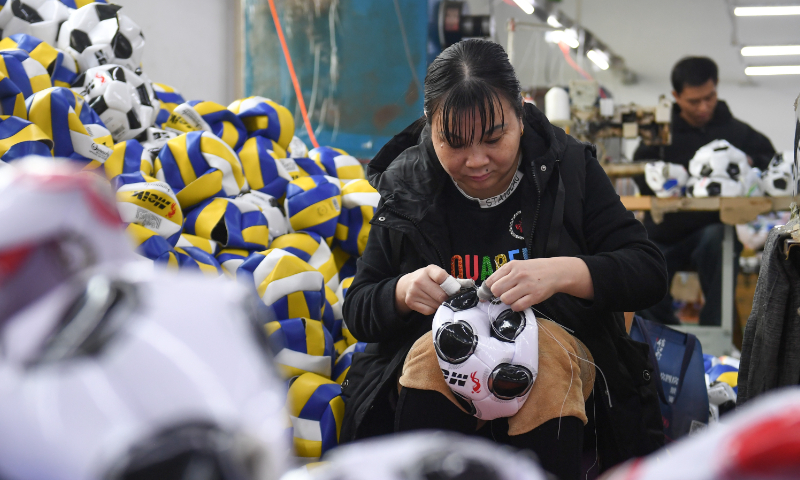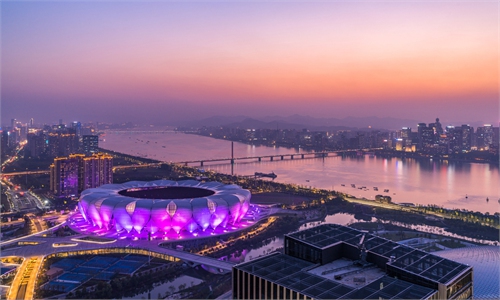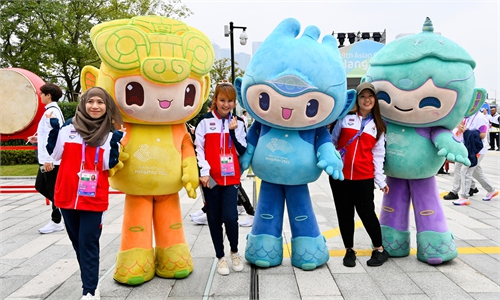Private enterprises actively participate in the Asian Games, sharing economic dividends of the sports event

Workers make footballs at a factory in Yiwu, East China’s Zhejiang Province, on December 5, 2022. Photo: VCG
Chinese private enterprises have actively participated in the 19th Asian Games, which is held from Saturday to October 8 in Hangzhou, East China's Zhejiang Province, and shared in the economic dividends of the sports event, demonstrating the vigorous development of the country's private companies, especially small and micro-sized firms.
According to a report jointly released by MYbank and Sesame Credit, more than 60 percent of the suppliers to the Games are small- and micro-merchants, local media in Hangzhou reported on Friday. In Zhejiang, over a quarter of small and micro-merchants harvested more orders from the Games, and more than 22 percent of these enterprises began to prepare for the event a year in advance, according to media reports.
As of September 19, 2023, a total of 6,880 firms have won Asian Games tenders, of which 4,051 are small- and micro-sized enterprises.
The manufacturer for the dragon boat competitions, Xiangrui Boat in Fuyang, Hangzhou, provided 26 boats for the Games. Tang Hongbin, an executive from the company, said that they used 15 patented technologies for the Games, giving the dragon boat a complete design and smooth appearance, which reduced friction and increased speed.
In addition to professional technical support, the merchandise and services provided by the Hangzhou Asian Games are also gaining popularity.
Data showed that 80 percent of the Games badges come from a badge factory in Wenzhou in the province. Together with other enterprises serving the Games in Hangzhou, the factory started to prepare for the event nearly two years in advance, according to local media reports.
Chen Jiashu, chairman of the company, said that riding on the momentum of the Asian Games, his badge factory is seeing daily output of 30,000 to 50,000 products, and the output value is expected to reached hundreds of millions of yuan.
A manager surnamed Wang at a Yiwu-based ball manufacturing enterprise told the Global Times earlier that their orders are currently scheduled to the end of September.
"In fact, since the World Cup in 2022, our football related orders have been rising rapidly. Nearly half of our footballs were exported. This year, we have received more orders from the domestic market, as well as from the Asian market," Wang said.
From January to July 2023, Yiwu exported 4.21 billion yuan ($576.8 million) worth of sporting goods, up 24.6 percent year-on-year, according to Securities Daily, citing statistics from the Yiwu customs authority. Exports of sporting goods to Asian countries increased 12.7 percent year-on-year to 1.42 billion yuan.
"The active participation of micro and small enterprises in this Asian Games reflects the importance of these enterprises in our economy, and it also indicated that such major events and projects bring benefits to a large number of private enterprises," Wang Peng, an associate research fellow at the Beijing Academy of Social Sciences, told the Global Times on Saturday.
Every major event creates a so-called dividend spillover effect. "I believe that the hosting of the Asian Games will not only increase the profitability of private enterprises, but also enhance their own products as well as their market influence," Wang said, noting that the Asian Games is also one of the ways to implement the government's policies to encourage and support the private sector.
Since 2023, the Chinese government has released a number of measures and policies for the private sector aimed at thoroughly solving the problems and difficulties they face, so as to fully unleash the huge potential across China's private sector.
On Friday, Chinese top market regulator, the State Administration for Market Regulation, released 22 measures to boost the development of the private economy, including the continuous improvement in the environment for development and increased policy support.



